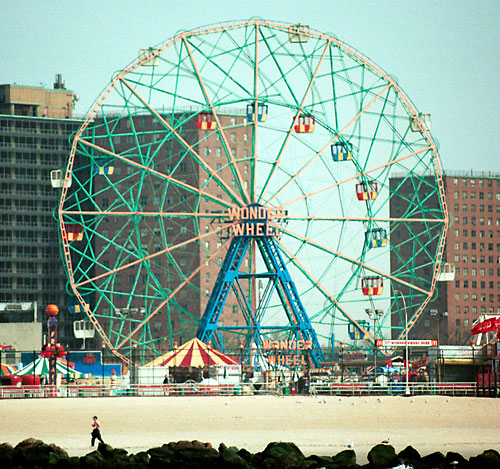The city won a key battle in the block-by-block war for the future of Coney Island by buying a parcel of land once coveted by Mayor Bloomberg’s bitter rival.
The Economic Development Corporation paid $11 million for part of the land where Deno’s Wonder Wheel park stands — and thus sent Joe Sitt of Thor Equities reeling.
Sitt’s own bid to buy the parcel from the Ward family reportedly unraveled this summer.
The one-acre site is the first piece of the puzzle in the city’s plan to transform the kitschy and individually owned attractions in Coney Island into a city-owned, year-round, Vegas-style, nine-acre theme park.
Counting this week’s purchase, the city now owns about four of those nine acres while Sitt owns five, plus about six adjacent acres.
Coney Island stalwarts cheered the news that the city — not Sitt — had secured the plum piece of Boardwalk-front property. Dennis Vourderis, who operates both the Wonder Wheel and its adjacent attractions, was especially pleased. He owns the land under the landmark Ferris wheel, but was only a tenant on the land that the city just bought.
“We are delighted with the news that the city … will be our landlord,” said Vourderis in a statement.
City officials rushed to say that the purchase of land would not threaten the popular Deno’s theme park.
“Wonder Wheel Park maintains a lease to operate on the property for a term of 12 years, through 2020,” the city statement said.
Standing in the way of the city’s sweeping redevelopment plan is, of course, Sitt and his acres of prime oceanfront real estate in the proposed amusement core, bounded by the Boardwalk, Surf Avenue, and West 10th and West 16th streets.
For decades, that area has slowly slid into decay. But in 2003, Sitt started buying up properties inside and outside Coney’s declining amusement area, eventually unveiling a $2-billion Xanadu that called for a massive new theme park, new rides, an indoor entertainment complex and, more controversially, hotels and residential units.
In a bombshell purchase, Sitt paid Astroland owner Carol Albert $30 million for her land in 2006.
Thor then leased the land back to Albert for the past two years, but she abruptly closed the park after Labor Day, because Thor had not agreed to another extension.
To counter Sitt’s vision, Bloomberg last fall showed off his own plan to rezone the amusement area as parkland that would be leased out to a single theme-park operator or to multiple ride companies. Residential units are not part of the mayor’s plan, but a hotel is.
Since then, it’s been a war of words between Sitt and the Bloomberg administration despite many similarities in the two camps’ plans.
Sitt says that the city is blocking his grand design to refashion the “People’s Playground” into a world-class pleasure destination. He says his plan could be realized without the need to spend tens, if not hundreds, of million dollars of taxpayer money to buy his land and land owned by other smaller landowners.
Bloomberg officials have said that Sitt, best known as a shopping mall developer, is simply not up to the job of rebuilding Coney Island.
But the Bloomberg Administration is up against the clock. It wants to start the time-consuming rezoning process this winter, which would make it tough to finish before next year’s mayoral election, which may or may not include Bloomberg running for re-election.
One constant critic of both sides said he’s happy the city is the new landlord for Deno’s, the last remaining amusement park on the sandy peninsula now that Astroland has closed.
“It’s much better that it’s in the city’s hands, than in Thor’s hands,” said Dick Zigun, the founder of the Coney Island Circus Sideshow.
Zigun dismissed Thor’s commitment to the amusement industry, because of its recent tussle with Astroland.
Sitt’s office declined to comment for this story.


























